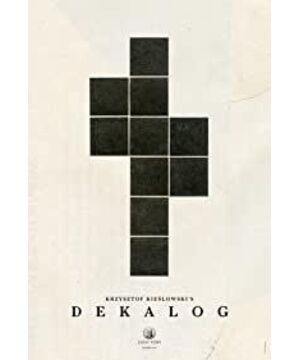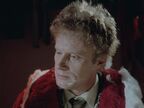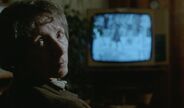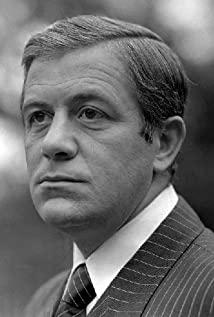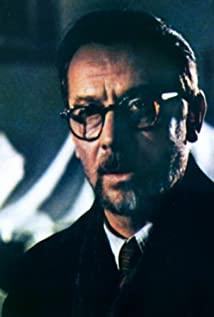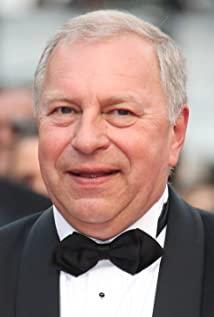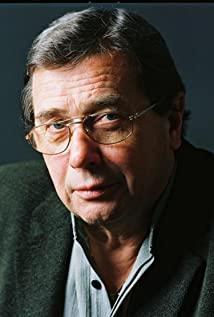Dorota's husband Andrzej is dying ill, but Dorota is pregnant with a friend's child. Dorota had been unable to conceive a child before, and this was her last chance as she grew older. She decides whether or not to keep the child, so she finds her husband Andrzej's attending doctor, wondering if her husband will survive, and if she can, then she will have an abortion. The doctor panicked when he knew Andrzej's condition was getting better, which caused Dorota to leave the child behind.
"Don't call God's name to swear a false oath." is the content of the second commandment. At first glance, the content in the movie just violated this commandment: Dorota found the doctor and said that he would have an abortion in 1 hour. The doctor persuaded her to keep the baby because her husband was about to die. Dorota said, "You swear?" The doctor said, "I swear." Here, the doctor apparently took a false (false) oath because he had learned of signs of improvement of Dorota's husband Andrzej's condition before. Although the audience didn't know if this was a sudden change in the condition, the end clearly proved that the doctor had said that he was panic and violated the commandment.
Whether you are a Christian or not, as a normal person with a conscience and morality, we will of course act according to each of the Ten Commandments, although I have to say that today, if the content of the Ten Commandments can judge people like the law Whether it is guilty or not, then the result will be quite disappointing. Apart from murder and arson, robbery and rape, law and morality have diverged far and wide. However, the topic concerned by the Ten Commandments is obviously not the kind of "yes" or "no" situations. Most stories are set in the gray stage of 40% to 60%. How should people face and deal with it. The story of the second commandment is like this. It's not just Dorota who is in a dilemma. The doctor's dilemma is even more intense.
Yes, even though the doctor tells the truth, Andrzej will survive. In this situation, if the doctor only considers the second commandment, then obviously the final result will be imperfect. Therefore, when the doctor told his story to Barbara, he actually told the audience that the doctor believed in the importance of the child to his parents, and he would surely let the child survive, at the cost of a panic.
Keith has excellent control over the rhythm of the film, one of which is when the doctor tells Barbara his story. This story has only two parts. The first time the doctor told it was at the beginning of the film. He described the scene of the child changing the baby teeth. This scene doesn't seem to make much sense. The actual statement is the fun that the two children brought to him and his wife, and it paved the way for the doctor's decision below. The second doctor’s story has reached the end. His home was destroyed when he went to work, leaving only a big hole. My inference (*) may be that during World War II, the doctor’s apartment was bombed and his family was lost, including two children. . Soon after, the doctor called Dorota and asked her to keep the baby.
(*) Due to the source of the film, the subtitles are not very clear, so I use the word "inference" here; however, it may be the case in the original script. I haven't found the script of this film yet, I hope anyone who knows can correct me.
The issue of abortion actually has a profound meaning in the Catholic doctrine, because the Catholic Church does not allow abortion. It violates the fifth commandment in the Ten Commandments: Don’t kill. Originally, abortion was a very sensitive topic in a Catholic country, but when the movie came up, one of the conflicting points was positioned on "abortion or not". It seems that abortion is an uncommon thing, and Keith seems to have intentionally conveyed it. A voice that resists tradition.
With this, the outsider's voice is very good. Therefore, we must not just put the commandment in a rigid manner, thinking that the doctor is only observing the command "Don't kill" and ignore the logic of the story. The doctor is not bluntly weighing the second or fifth commandment-although for a Catholic country like Poland, the doctor is obviously a believer-the final decision is the result of his own consideration.
The last two scenes of the film proved a positive result. Dorota returned to the symphony orchestra, showing that her heart knot had been untied and her life was normal, and her dazed gaze was to find if there was a doctor in the audience, because the doctor said that she wanted to hear her playing. Andrzej came to thank the doctor and complained about Datong's unsatisfactory things before he fell ill. However, he had confidence in life because his wife was pregnant with a child. Isn't the doctor who made all this? Andrzej asked the doctor, do you know the meaning of having children? It was the voice of the doctor.
Many viewers will wonder, is everything really perfect? What would happen if the child's biological father knew? What if Andrzej knew that the child was not his own? In fact, these questions have been omitted, because this is not the focus of the movie. You can understand that the child’s biological father never contacted Dorota, or Andrzej was also happy to be an adoptive father... In short, Kijeslovsky omitted it. As Andrzej gradually recovered from his illness, assuming that all the problems had been resolved within this time, he directly used the thank-you scenario to illustrate the final result. Even if everything really has a follow-up entanglement, let Chen Qiaoying continue to write it, and Kieslowski's mission is over.
The ending of the movie surprised the audience who had watched the "First Commandment" because it was very different from the view of the "First Commandment". In the "First Commandment", "Science" is "lost" to "Accident-Fate". After watching the "First Commandment", I guess this movie is probably to express a kind of praise for the sacredness of the "Ten Commandments", which violates The commandment requires a price and even life, so now the doctor has violated the "second commandment." According to this logic, the doctor should not die, but the result is a comedy despite the gloomy end, which also suddenly reversed the direction of the whole movie. : It turns out that this movie called "Dekalog" praises humanity rather than divinity. Keith wants to explain that under the brilliance of humanity, the commandments of religion are actually not worth mentioning. The following eight short films are all in this frame. Moving underneath is the "voice of resistance to tradition" mentioned above.
From a technical point of view, the rendering of atmosphere is one of the attractions of this "second commandment". The light in the old apartment is very similar to the use of sky light in CG works. After reading the entire Ten Commandments, the first scene I remember is The close-up of the apartment in the early morning is like the light refracted by the crystal ball in the "Twin Flower". The metaphor of light is also very obvious. For example, when Dorota is at home, it is either night or cloudy, which metaphors her sadness. In the final scene, Andrzej thanked the doctor. At first we could only see the silhouette of a figure at the door. When Andrzej walked into the room, the light hit him. This is exactly the experience he was talking about. He walked from the dark to another. world.
Metaphors and symbols in the film also strongly promote the development of the film plot, and also bring a lot of fun to the speculation of the audience. Dorota breaks off the leaves of the plant, metaphors that she is lonely and helpless, alone in dealing with the problem, but in the end she tried to break the stem of the plant without success. It also metaphors that she is still trying to find an exit; the broken tea cup is a metaphor for her At this moment the mind is as fragile as it is. The water droplets dripping from Andrzej's ward are intermittent, symbolizing the weakness of his life, and the atmosphere created by the audience seems to be able to clearly understand his pain; finally the bee crawling out of the water cup is a portrayal of Andrzej's improvement and his life saved.
One more thing I want to say is that Kijeslovsky also made a little joke for everyone. He let the patients who were in the same ward with Andrzej not seem to be a big problem first, not only verified the doctors In the previous sentence, "Some people are incurable but survived, and some people die well." For him, they died well. It was the victim of the war, and it was his own feelings, but At the same time, it once again stated the director's "agnostic view of fate." Like most movies in the past, this point may be that the director secretly insinuated the political environment of the era.
————————
Two additional points:
First, Poland is a Catholic country, not a Protestant country. We all know that there are some differences between the Catholic Ten Commandments and the (mostly) Protestant Ten Commandments. When we watch Kieslovsky’s movies, we have to stand in the context of a Catholic country and understand some of the differences between Catholicism and the doctrines of the Apostolicism.
Second, the most important scenes in the "second commandment" are the two scenes of the doctor telling her own story to Barbara. If these two scenes are ignored, the "second commandment" is almost illogical. I really fell into mysticism-although the first impression of watching a movie like "Liangshenghua" will feel that Kieslowski’s films are loosely structured and aimless, but in fact all movies including his early documentaries , And even "endlessness" are actually very logical stories.
View more about Dekalog reviews


